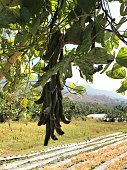THE DEVIL’S BEANS

Mucuna pruriens is a tropical legume native to Africa and tropical Asia.
It is often known as Velvet beans or Devil’s beans and is popularly called WEREPE in the Yorubas (my tribe).
The plant is an annual climbing shrub with long vines. When the plant is young, it is almost completely covered with fuzzy hairs, but when older, it is almost completely free of hairs except for the seed pods which are covered in loose, orange hairs.
**
.jpg)
One of its essence is that it has agricultural and horticultural value and is also widely used in herbalism.
Some of its usefulnesses are as follow:
• Mucuna pruriens is used as an important forage, fallow and green manure crop.
• M. pruriens is a widespread fodder plant in the tropics. To that end, the whole plant is fed to animals as silage, dried hay or dried seeds.
• The bean seeds can be cooked for consumption and can also be fermented to form a food similar to Tempeh.
• The seeds of Mucuna pruriens have been used for treating many dysfunctions.
• The plant and its extracts have been long used in tribal communities as a toxin antagonist for various snakebites.
• It is been used in the treatment of Parkinson’s disease as it is a good source of natural L-DOPA (Levodopa) which provides symptomatic relief.
Velvet beans also calms nerves, reduces spasms and relieves pain.
• Researches have also shown that velvet beans lowers level of prolactin in the body which causes over 70% of erectile dysfunction in men. This increases testosterone and helps men last longer in bed i.e. It corrects quick ejaculation.
Mucuna increases semen volume, sperm count and sperm motility. It is also a good aphrodisiac which simply means that it increases libido (sexual urge).
• Dried leaves of M. pruriens are sometimes smoked.
• Mucuna has significant blood sugar lowering action and also lowers blood pressure.
• The hairs on the mucuna pod are used to treat several species of parasitic worms (excluding tapeworms).
.jpg)
Having shown to have these numbers of life-saving properties, it is however popularly known to have a menace – the orange hairs covering the seed pods.
The hairs contain serotonin and the protein mucunain which cause severe itching when the pods are touched. And trust me, I mean severe itching that can let out the flow of blood hence, the name Werepe. This itching is only known to reduce when the body is rubbed with palm oil.
Here are some comments from those who experienced it.
http://www.nairaland.com/188817/devils-bean-plant-werepe
REFERENCES:
https://en.wikipedia.org/wiki/Mucuna_pruriens
http://www.secrets-of-longevity-in-humans.com/mucuna-pruriens.html
https://examine.com/supplements/mucuna-pruriens/
http://healthbubbles.com/gb/?p=3343
http://www.nairaland.com/188817/devils-bean-plant-werepe
http://herbalsatt.blogspot.com/
https://www.agroensured.ng/mucuna-pruriens-details-plant-werepe/
images @freeimages.com
Go here https://steemit.com/@a-a-a to get your post resteemed to over 72,000 followers.
I almost want to flag this because those beans are so brutal. But, hahaha, I gave you an upvote!
hahaha. I can't stop laughing.
......got me following you.
Hahaha, cool! Nice post!